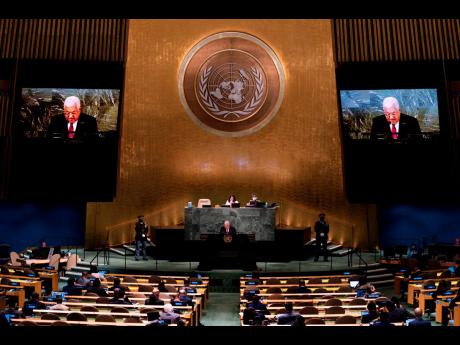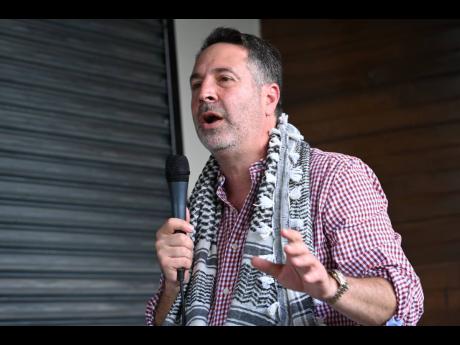Jalil Dabdoub | Are we serious about breaking away from colonialism?
Recently, I attended the book launch of Roadblock, Jamaica’s resistance to the Caribbean Court of Justice by A.J. Nicholson. The event caused reflection on our constitutional reform process, colonialism and Jamaica’s attempts to break the vestiges of colonialism. Notwithstanding one’s position on the CCJ, Mr Nicholson’s book should be read by persons serious about constitutional reform and attempts to break colonial ties.
The slow pace of constitutional reform and lack of consensus has done much to hinder progress. Political tribalism takes precedence even on this serious issue. This is illustrated in the ‘debates’ about our republican status and the CCJ, and rumblings on Mark Golding’s eligibility to sit in Parliament as a Commonwealth citizen.
Instead of addressing the anomalies in Sections 39 and 40 of the Constitution and arriving at a consensus on treating with the issue of dual allegiance, our political leaders are engaged in petty politics. This despite the position of the Court of Appeal indicating that Golding is not in breach of the Constitution.
Unlike other people, we do not have to fight or resist a colonial master to complete our decolonisation process. Finality on decolonisation lies in our hands. Our failure to finalise decolonisation is an indication of the immaturity of the political directorate.
PREVARICATE
We talk about colonialism and the wrongs meted out to us, yet we prevaricate on the decision to cut its vestiges. Our prevarication is not surprising, given Jamaica’s and CARICOM’s tame approach to colonial issues such as Palestine.
All CARICOM states now recognise the Palestinian state. Despite now understanding the necessity for objectivity and balance in resolving the historical wrong meted out and continuing to be meted out to Palestinians, CARICOM’s approach to Palestine reflects a position akin to supporting colonialism.
Sir Ronald Sanders’ claim, in the imperative for equal recognition in resolving the Israeli-Palestinian conflict, that the Palestinian issue is “one of the most enduring and complex issues “is not accurate and certainly no excuse for CARICOM to stridently support Palestine”.
The Palestinian issue is classical settler colonialism. In 1917 the British, through the Balfour Declaration, “on behalf of one people (the British) granted to a second people (white European Zionists Jews) the land of a third people (the Palestinians) “. Undoubtedly, Britain had no legal or moral authority to do so. Its actions were racist and based on white supremacy, a hallmark of settler colonialism.
To term the Palestinian issue other than colonialism is to accept the West’s incorrect and self-serving narrative. It is a shameful admission that we in the Caribbean remain mentally colonised by colonial masters and imperial powers.
In ‘Establishing even-handedness: Antigua and Barbuda and Palestine’, Sir Ronald Sanders stated that when European nations partitioned Palestine “no Caribbean countries, except Haiti, were UN members …. . This European-dominated decision-making process left many regions without a voice, a historical oversight that small states today are working to correct, ... “
To correct this historical wrong CARICOM must make it clear to the imperialist powers that Israel is nothing more than a settler colony. Born of terrorism, sustained by terrorism. Created by the morally repugnant acts of ethnic cleansing, forced displacement and murder of the Palestinian people ( The 1948 Ethnic Cleansing of Palestine by Ilan Pappé).
There once was a Palestine. Today there is none. Europeans came and took their homes and land. No people will accept that. Until the world acknowledges and corrects this historical moral wrong there will always be resistance. CARICOM must lead this charge.
CANNOT BE LIMITED
CARICOM’s support for Palestinian rights cannot be limited to the recognition of the Palestinian state. They must acknowledge the historical wrong perpetrated on the Palestinian people and reject the settler colonial principles behind the formation of the Israeli entity. Unequivocal condemnation of Israeli actions of human-rights abuse, apartheid, war crimes, genocide and illegal settlement expansion (creating ‘Palestinian Bantustans’) is paramount but insufficient.
Since its inception, Israel has been a rogue state and is on the way to being a pariah. CARICOM has no business maintaining trade and diplomatic ties with this settler colony. Yet only one CARICOM nation, Belize, has taken the correct step and severed diplomatic ties with this colony.
Sir Ronald Sanders in ‘After 13 years CARICOM aligns in unified stand for Palestine and peace’ said:
“Just as Israel has the right to exist as a state and as a homeland for Israelis, so too does Palestine for Palestinians. “
But does Israel really have a right to exist as a settler colony and apartheid state? Is it that we accept colonialism being imposed on one people and refuse its imposition on us? Are we now accepting the supremacy ideology of our former colonisers?
No state has a right to exist legally or morally. States are political entities which can change or dissolve at any time. The right of self-determination of the people in that state allows it to exist. No state should be part of the international community if it fails to respect international law, human rights and is an apartheid state.
CARICOM must be clear in its words and actions. It cannot, on one hand, speak out against the colonial wrongs inflicted on us as Caribbean people, yet at the same time be willing to maintain diplomatic and trade relations with a racist settler colony.
Our small size has never been an impediment to our supporting, leading and making change. The South African apartheid struggle is certainly the most prominent example.
Until we hold principled positions and unite on core issues, we will forever fail to break away from colonialism; not only in a formal manner, but more importantly, to free ourselves of the lingering effects of being mentally colonised.
Jalil S. Dabdoub is an attorney-at-law. Send feedback to columns@gleanerjm.com.


